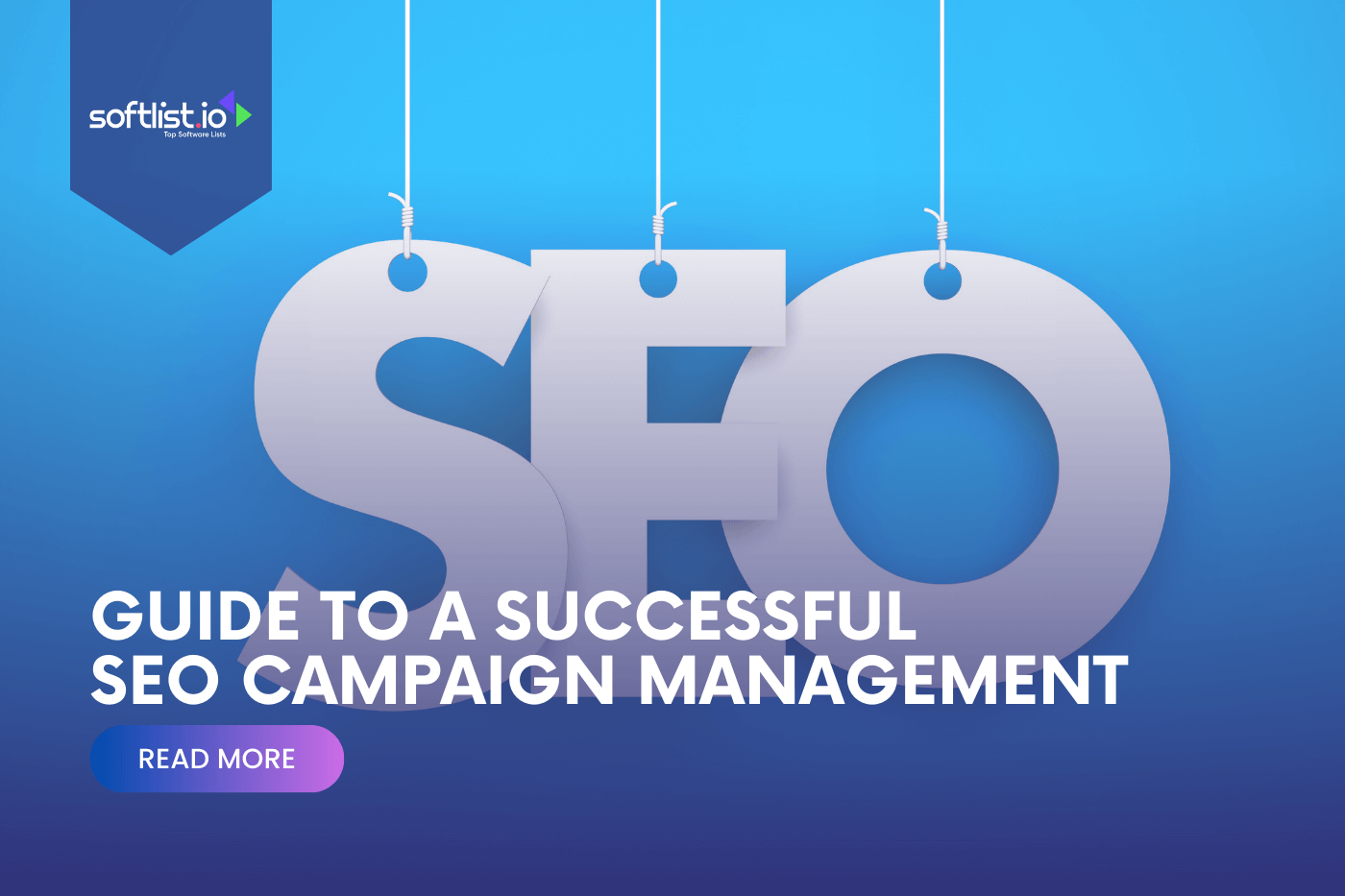Mastering SEO campaign management can feel overwhelming. With search engine rules constantly changing and fierce competition for top search results, it’s easy to feel lost.
The challenges are significant whether you’re trying to boost your online visibility, increase organic traffic, or get more value from your digital marketing efforts.
So, this guide is aimed at turning these challenges into opportunities. It offers straightforward strategies, practical steps for improving your website’s ranking, and advice for achieving lasting success.
What Is the Meaning of Search Engine Optimization or SEO?
Source: Canva Pro
Search Engine Optimization, or SEO, is a digital marketing strategy to enhance a website’s visibility in search engine results pages (SERPs).
SEO aims to increase organic (non-paid) traffic to a website by optimizing its content, structure, and on-page elements like titles, meta descriptions, and keywords, along with off-page factors such as backlinks and social media signals.
SEO practices are grounded in understanding how search engines work, what people are searching for, the search terms or keywords they use, and the target audience’s preferences.
By making a website more accessible and appealing to search engines, SEO helps ensure that a site ranks highly for relevant queries, thereby improving the chances that potential customers will find and visit the site.
Effective SEO involves a combination of technical adjustments, content enhancement, and link-building efforts tailored to align with the ever-evolving algorithms of search engines like Google, Bing, and others.
What Is SEO Campaign Management?
SEO campaign management involves the planning, executing, and monitoring of strategies designed to improve a website’s search engine rankings with the ultimate goal of increasing organic traffic and achieving specific business objectives, such as generating leads, increasing sales, or enhancing brand visibility.
If you want to enhance your SEO campaign management skills, you can take online courses such as ASK Training’s Digital Marketing Course. Comprehensive SEO courses cover keyword research, on-page optimization, and link-building strategies and are taught by industry experts.
What Are the Essential Components of Effective SEO Campaign Management?
Effective SEO campaign management is crucial for improving a website’s visibility in SERPs and increasing traffic and potential conversions.
Keyword Research
- The foundation of SEO: Keyword research involves identifying the terms and phrases potential customers use to search for products, services, or information online. It’s the foundation of SEO as it informs the direction of your content and optimization strategies.
- Tools and Techniques: Utilize tools like Google Keyword Planner, SEMrush, Ahrefs, and others to discover keywords with high search volumes and relatively low competition. Understand user intent behind keywords to align content accordingly.
On-page & Off-page Optimization
- On-page SEO: Refers to optimizing individual web pages to rank higher in search engines. This includes optimizing title tags, meta descriptions, headers, content, images, and URLs for targeted keywords. Ensuring a site is mobile-friendly and loads quickly is also crucial.
- Off-page SEO: Involves activities outside your website to impact your rankings within SERPs. This primarily includes link building (getting high-quality backlinks from reputable sites), social media marketing, and influencer outreach.
Content Creation
- Quality and Relevance: Creating relevant, high-quality content that addresses the needs and questions of your audience is essential. Content should be engaging, informative, and optimized for the keywords identified in your research.
- Diverse Formats: Include various formats such as blog posts, articles, infographics, videos, and more to cater to different preferences and enhance engagement.
Review Your Technical SEO
- Site Structure and Navigation: Ensure your website has a logical structure and easy navigation. This helps search engines crawl and index your site more effectively.
- Mobile Optimization: With the rise of mobile search, having a mobile-responsive website is crucial for ranking well.
- Site Speed: Page speed is a ranking factor. Use tools like Google’s PageSpeed Insights to identify and fix issues that slow down your site.
- Secure Sockets Layer (SSL): Ensuring your site is secure (https://) is important for user trust and SEO.
Google Analytics & Reporting
- Track Performance: Use tools like Google Analytics and Google Search Console to track the performance of your SEO efforts. Monitor metrics like organic traffic, bounce rate, conversion rate, keyword rankings, and backlink profile.
- Adjust Strategies: Analytics allow you to see what’s working and what isn’t, enabling you to adjust your strategies accordingly. Regular reporting helps measure progress toward your SEO goals and demonstrate ROI.
How to Effectively Manage Your SEO Campaign Strategy?
Source: Canva Pro
Managing an SEO campaign strategy effectively requires a structured approach that aligns with your business goals. By focusing on the following steps, you can ensure your SEO efforts are coherent, measurable, and adaptable to changes in search engine algorithms and user behavior.
Step 1. Set Achievable Objectives for Your SEO Plan
Start by defining clear, achievable objectives for your SEO plan. These goals should be specific, measurable, attainable, relevant, and time-bound (SMART).
Whether it’s improving organic traffic by a certain percentage, increasing the ranking of specific keywords, or enhancing your site’s visibility in local search, setting precise objectives will help guide your SEO strategy and provide a benchmark for measuring success.
Step 2. Consistently Review Your Website
Regularly reviewing your website is crucial to identify areas for improvement. This includes auditing your site for technical SEO issues, like slow page load times, mobile usability issues, or broken links, and evaluating the user experience (UX).
SEO audit ensures that your website is technically sound and provides a positive UX, which is fundamental to retaining visitors’ interest and satisfying search engine ranking factors.
Step 3. Perform Keyword Research
Keyword research is the cornerstone of any SEO campaign management. It involves identifying the terms and phrases that potential customers use in search engines.
This step informs the content creation strategy and helps understand the market’s demand, the competition, and opportunities for niche targeting. Effective keyword research helps align your content with user intent, increasing the chances of attracting qualified traffic.
Step 4. Optimize On-Page Components
On-page optimization involves tweaking the elements of your web pages to make them more search-engine friendly.
This includes optimizing title tags, meta descriptions, headers, and images with relevant keywords. It also involves ensuring that your content is highly quality, valuable, and structured to promote user engagement.
Proper URL structure and internal linking strategy are also part of on-page optimization, aiding in site navigation and distributing page authority across your website.
Step 5. Optimize Off-Page Components
Off-page SEO focuses on building the site’s reputation and authority through external means. This primarily involves acquiring high-quality backlinks from reputable websites in your industry, which can significantly impact your site’s rank in search results.
Social media engagement and local SEO strategies, like managing your Google My Business listing, also fall under off-page optimization. These efforts help increase your site’s visibility and credibility online.
Step 6. Create High-Quality Content
Content is the lifeblood of any SEO campaign strategy. High-quality, engaging, and relevant content attracts and encourages users to engage with your website. It should serve the user’s intent, answer their queries, and offer value that distinguishes your site from competitors.
Diverse content formats, such as blog posts, videos, infographics, and podcasts, can cater to different audience preferences and increase the chances of shares and backlinks.
Step 7. Track Your Progress
Finally, tracking the progress of your SEO campaign management is essential for understanding its effectiveness and areas that require adjustment. Tools like Google Analytics and Google Search Console provide insights into organic traffic, user behavior, conversion rates, and keyword rankings.
Regular analysis allows you to refine your SEO strategy, focusing on tactics offering the best return on investment (ROI) and adjusting those underperforming.
What Are the Benefits of an SEO Campaign Management
Source: Canva Pro
- Increases Organic Search Traffic: SEO helps improve your website’s visibility in search engine results, leading to increased organic traffic.
- Enhances User Experience: By optimizing for SEO, you also improve the usability and user experience of your website, which can keep visitors on your site longer.
- Improves Brand Visibility: Ranking higher in search results increases your brand’s visibility online, helping to establish brand awareness and recognition.
- Cost-Effectiveness: Compared to paid advertising, SEO is cost-effective in the long run, as it targets users actively searching for your products or services online.
- Targets Quality Traffic: SEO enables you to attract visitors who are genuinely interested in what you offer, which can lead to higher conversion rates.
- Supports Content Marketing: Creating high-quality, relevant content as part of your SEO strategy attracts search engines and keeps users engaged.
- Enhances Credibility and Trust: Websites on the first page of search results are often perceived as more trustworthy and credible by users.
- SEO Campaigns Provide ROI: SEO campaigns deliver a high return on investment (ROI).
- Encourages Local Engagement: Local SEO strategies help increase visibility in local search results, driving traffic from local customers and boosting physical store visits.
- Provides Measurable Results: With the right SEO tools, you can measure almost every aspect of your SEO campaign, allowing you to see the direct impact of your efforts.
- Gives Competitive Advantage: By optimizing your website, you can rank higher than competitors, potentially capturing more market share.
- Adaptable to Market Changes: SEO strategies can be adjusted based on market trends, search engine algorithm updates, and changing user behavior, keeping your online presence resilient.
Best SEO Campaign Management Software
|
Primary Rating:
3.5
|
Primary Rating:
3.5
|
Primary Rating:
3.5
|
Final Thoughts
Hopefully, this guide offers you a comprehensive roadmap to navigate the complexities of SEO. Whether you’re just starting or looking to refine your approach, the insights provided lay the foundation for achieving measurable growth and success in the digital realm.
As you look to streamline your SEO efforts further and optimize your strategy, we invite you to explore the potential of SEO automation. With the power to enhance efficiency and effectiveness, SEO automation tools can transform your approach to SEO campaign management.
Discover how to leverage these innovative solutions by reading about SEO Automation on our website, Softlist.io. Take the next step in optimizing your digital marketing strategy and unlock the full potential of your SEO efforts with us.
Frequently Asked Questions
How Does Content Quality Affect an SEO Campaign?
High-quality, relevant content satisfies user intent and is favored by search engines. It can lead to higher rankings, increased engagement, and better conversion rates. Content quality also affects link-building efforts, as authoritative sites are more likely to link to valuable resources.
How Do Backlinks Affect an SEO Campaign?
Backlinks, or inbound links from other websites, signal to search engines that your content is valuable and authoritative. High-quality backlinks can significantly improve your site’s ranking and visibility. However, poor-quality links can harm your SEO efforts.
How Long Does It Take to See Results From an SEO Campaign?
SEO is a long-term strategy. Results can vary widely based on competition, industry, and the current state of your website. Generally, noticeable improvements can take anywhere from a few months to a year.
How Do I Measure the Success of an SEO Campaign?
Success metrics include improved rankings for target keywords, increased organic traffic, higher engagement rates, and improved conversion rates. Tools like Google Analytics and Google Search Console can help track these metrics.
What Are Some Common Challenges in SEO Campaign Management?
Common challenges include staying updated with search engine algorithms, managing and improving site speed, and creating content that balances user intent with keyword targeting. Staying informed, using reliable SEO tools, and focusing on providing value to your audience are key strategies to address these challenges.











